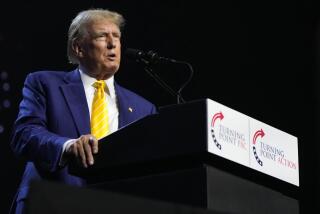Boycott Called for Products From Firms Tied to RU 486
- Share via
WASHINGTON — The National Right to Life Committee and other anti-abortion groups Wednesday called for a boycott of products made by the companies linked to RU 486, the so-called abortion pill that is about to be tested for possible U.S. manufacture.
“We have not made this decision lightly but feel morally compelled to hold these companies accountable,” Wanda Franz, president of the National Right to Life Committee, said at a press conference.
She said that the coalition of anti-abortion organizations, which also includes the Southern Baptist Convention, will take action against Hoechst AG, the parent German company; Roussel Uclaf, the French manufacturer of RU 486; and two U.S. subsidiaries, Hoechst Celanese, a chemical company, and Hoechst Roussel, a pharmaceutical firm.
The threat of such a boycott by anti-abortion groups is considered responsible, in part, for Roussel Uclaf’s reluctance to bring the drug to the United States during the six years it has been available in France. The other major factor was opposition by the George Bush Administration.
The climate changed after the election of President Clinton, who advocates abortion rights.
Franz said that her coalition considers the companies “fully responsible,” despite the French firm’s recent decision to give its U.S. patent rights for RU 486 to the nonprofit Population Council, a reproductive research group based in New York.
The council expects to find a U.S. manufacturer for the pill and plans to begin human studies this fall that are expected to last about six months. The Food and Drug Administration has pledged to move as quickly as possible to evaluate the research and decide whether to license the drug.
The pill removes the risk of surgery and could enable women to have abortions without going to abortion clinics, which have been the target of strong protests. Prescribed by doctors and taken in the first eight weeks of a pregnancy, the pill successfully induces abortion in 96% of the women who take it.
Franz did not name the specific products under boycott but said that a list would be released within the next several weeks.
Andrea Stine, a spokeswoman for Hoechst Celanese, called the boycott decision “misdirected.” Hoechst Celanese “was not involved in the negotiations to bring RU 486 into this country, nor were we involved in the research, development or sales of the drug.”
And Sandra Waldman of the Population Council said that she doubts the boycott will have any effect on the process of getting RU 486 into the U.S. marketplace.
“There’s been no lack of companies and organizations interested in this drug,” she said. “In fact, dozens of companies have expressed interest in various aspects--marketing, distribution, manufacture--since last year,” when the council first became involved in negotiations to sponsor the drug in this country.
“They were not frightened by the controversy,” she added. “And it certainly should not affect a clinical study.”
More to Read
Sign up for Essential California
The most important California stories and recommendations in your inbox every morning.
You may occasionally receive promotional content from the Los Angeles Times.













